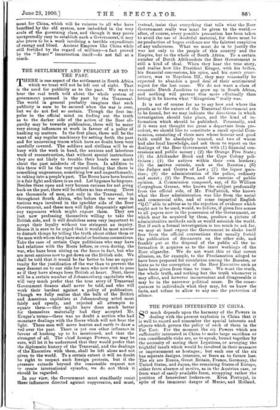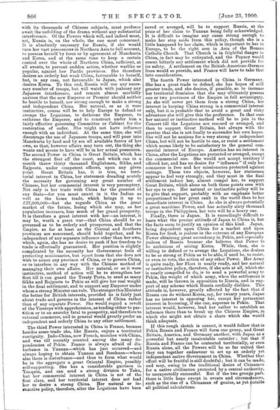THE POWERS INTERESTED IN CHINA.
SO much depends upon the harmony of the Powers in dealing with the present explosion in China that it is well to record and remember the special interests and objects which govern the policy of each of them in the Far East. For the moment the six Powers which are sufficiently interested in China to make large sacrifices or run considerable risks are, so to speak, bound together by the necessity of saving their Legations, or avenging the frightful insult which would be involved in their massacre or imprisonment as hostages ; but each one of the six has separate designs, interests, or fears as to future loss. The six are Russia, Great Britain, France, Germany, the United States, and Japan, the remaining States of Europe, either from absence of motive, as in the Austrian case, or from want of easily available force, occupying rather the position of benevolent lookers-on. Even Portugal, in spite of the imminent danger of Macao, and Holland, with its thousands of Chinese subjects, must perforce await the unfolding of the drama without any substantial interference. Of the Powers which will, and indeed must, act, Russia is, on the whole, the one most concerned. It is absolutely necessary for Russia, if she would turn her vast possessions in Northern Asia to full account, to possess herself by force or by agreement of Manchuria and Korea, and at the same time to keep a certain control over the whole of Northern China, sufficient, at all events, to prevent sudden action, whether warlike or popular, against her Pacific provinces. She therefore desires an orderly but weak China, favourable to herself, but, in any case, not favourable to Japan, which also desires Korea. To this end, Russia will use any neces- sary number of troops, but will watch with jealousy any Japanese interference, and remain almost morbidly anxious that the new Emperor or Premier should neither be hostile to herself, nor strong enough to make a strong and independent China. Her natural, or as it were instinctive, course will be to help Europe to defend or avenge the Legations, to dethrone the Empress, to enthrone the Emperor, and to construct under him a fairly effective governing Committee or Cabinet for the restoration of order. She might not have influence enough with an individual. At the same time, she will discourage the use of Japanese troops, and will pour into Manchuria by land and by sea all available forces of her own, so that; however affairs may turn out, the thing she wants and means to have will be in her actual possession. The second Power in China is Great Britain, which has the strongest fleet off the coast, and which can in a month throw thirty thousand Englishmen, Sikhs, and Rajpoots, under competent officers, upon any given point. Great Britain has, it is true, no terri- torial interest in China, her statesmen dreading acutely the necessity for governing any great number of Chinese, but her commercial interest is very peremptory. Not only is her trade with China far the greatest of any State—for you must count in it the Indian as well as the home trade, which brings it up to 27,000,000—but she regards China as the great market of the future, losing which she may, as her population increases, lose much of her grand prosperity. It is therefore a great interest with her—an interest, it may be, worth a great war—that China should be so governed as to be orderly and prosperous, and that the Empire, so far at least as the Central and Southern provinces are concerned, should hold together, and be independent of any separate influence other than her own, which, again, she has no desire to push if her freedom to trade is effectually guaranteed. Her position is slightly complicated by the necessity her Government feels of protecting missionaries, but a part from that she does not wish to annex any province of China, or to govern China, or to interfere in any way with the Chinese method of managing their own affairs. Her natural, or as it were instinctive, method of action will be to strengthen her fleet till it can guard the Treaty Ports, to send as many Sikhs and Rajpoots to Pekin as will give her real weight in the final settlement, and to support any Emperor under whom a strong Minister can rule. The stronger this Minister the better for British interests, provided he is fairly just about trade and governs in the interest of China rather than of any separate Power. She would regard a revolt of the Viceroys with apprehension, as tending either to par- tition or to an anarchy fatal to prosperity, and therefore to external commerce, and in general would greatly prefer an independent and orderly China to any other settlement.
The third Power interested in China is France, because besides some trade she, like Russia, enjoys a territorial contiguity. Indo-China, now French, marches with China, and was till recently counted among the many de- pendencies of Pekin. France is always afraid of dis- turbance in Yunnan—which has just occurred—and always hoping to obtain Yunnan and Szechuen—where also there is disturbance—and thus to form what would be in the aggregate a great Oriental Empire, possibly self-supporting. She has a considerable garrison in Tonquin, and can send a strong division to Taku, but her commercial interest in China is not of the first class, and her territorial interest does not lead her to desire a strong China. Her natural or in- stinctive policy, therefore, after the Legations have been saved or avenged, will be to support Russia, at the price of her claim to Yunnan being fully acknowledged. It is difficult to imagine any cause strong enough to make her step aside from this policy, though she is a little hampered by her claim, which is important to her in Europe, to be the right arm in Asia of the Roman Catholic Church. That Church is in frightful danger in China, in fact may be extirpated, and the Papacy would resent bitterly any settlement which did. not provide for its safety. A settlement on the British-American-German lines would so provide, and France will have to take that into consideration.
The fourth Power interested in China is Germany. She has a great trade to defend, she has hopes of still greater trade, and she desires, if possible, so to increase her territorial dominion that she may ultimately possess one or two provinces of the Empire in full sovereignty. As she will never get them from a strong China, her interest in keeping China strong is a commercial interest only, but it is probable that to avoid a great and risky adventure she will give this the preference. In that case her natural or instinctive method will be to join in the Concert till the Legations are rescued or avenged, and then to support Great Britain, but always with the proviso that she is not finally to surrender her own hopes. She will not be anxious for a very strong or independent China, but will not be hostile to one, or resist a settlement which seems likely to be satisfactory to the general com- mercial interest of Europe. America has no interest in China, after the Legations are protected or avenged, except the commercial one. She would not accept territory if offered her, and has no desire for " influence" if only her commerce is free and her missionaries protected against outrage. These two objects, however, her statesmen appear to feel very strongly, and they must in the final settlement induce her, almost compel her, to support Great Britain, which alone on both those points sees with her eye to eye. Her natural or instinctive policy will be to give that support, probably with an emphasis better proportioned to her great rank in the world than to her immediate interest in China. As she is always potentially a great maritime Power, and has actually sixty thousand troops in the Philippines, her vote will be a heavy one.
Finally, there is Japan. It is exceedingly difficult to learn what the precise attitude of Japan to China is, but the facts seem to justify an opinion of this kind. Japan, being dependent upon China for a market and upon Korea for food, is jealous in the extreme of any European Power obtaining great ascendency in Pekin, and especially jealous of Russia because she believes that Power to be ambitious of seizing Korea. While, then, she is willing to defend or to avenge the Legations, she desires to be so strong at Pekin as to be able, if need be, to resist, or even to veto, the action of any other Power. Her Army is quite ready, her Fleet is nearly ready, and her natural or instinctive policy, therefore, if she acts at all, which she is nearly compelled to do, is to send a powerful army to Pekin, the weight of which army, when the settlement is made, will be thrown in opposition to Russia, and in sup- port of any scheme which Russia cordially dislikes. This attitude is, however, greatly affected by the fact that if Russia can do without Korea, say, for twenty years, Japan has no interest in opposing her, except her permanent interest in becoming, if she can, supreme in Pekin. That interest would, however, lead her rather to establish an influence there than to break up the Chinese Empire, in which she might not obtain a share which she would think adequate.
If this rough sketch is correct, it would follow that in Pekin Russia and France will form one group, and Great Britain, America, and Germany another, with Japan as a powerful but nearly incalculable outsider ; but that if Russia and France can be contented territorially, or even Russia alone, all the Powers will be so far united that they can together endeavour to set up an orderly yet independent native Government in China. Whether that effort will be fruitful is still doubtful; but it can be made, and may, owing to the traditional desire of Chinamen for a native civilisation protected by a central an ority, be unexpectedly successful. But if the two grow part, there is little hope except in events and circum nces, such as the rise of a Chinaman of genius, as yet utside all political calculations.



































 Previous page
Previous page